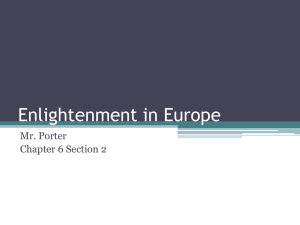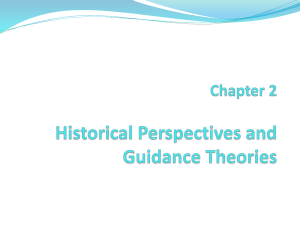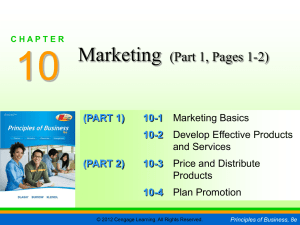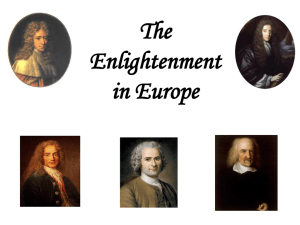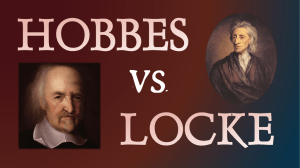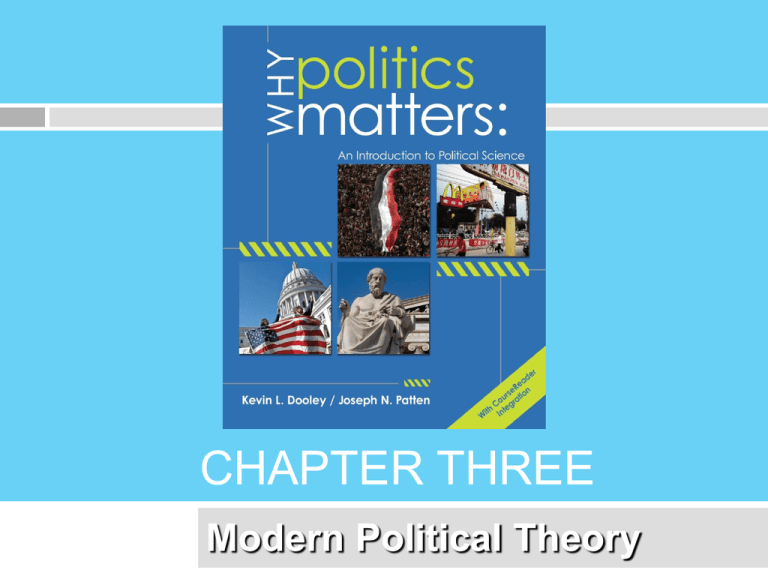
CHAPTER THREE
Modern Political Theory
LEARNING OBJECTIVES
• Define social contract. List and describe the
three main components of social contract
theory.
• Describe Machiavelli’s contribution to political
theory.
• Identify the main components of Machiavelli’s
“advice to princes.”
• Identify and describe Hobbes departure from
Ancient Greek political thought.
Copyright © Cengage Learning. All rights reserved.
2
LEARNING OBJECTIVES
• Describe Hobbes concepts of “the State of
nature,” “human nature,” and the terms of his
ideal of the social contract.
• Compare and contrast Locke’s views of “the
State of nature,” “human nature,” and the terms
of his ideal of the social contract. Define
Locke’s idea of civil society.
Copyright © Cengage Learning. All rights reserved.
3
LEARNING OBJECTIVES
• Compare and contrast Rousseau’s views of
“the State of nature,” “human nature,” and the
terms of his ideal of the social contract, with that
of both Hobbes and Locke.
Copyright © Cengage Learning. All rights reserved.
4
QUESTIONS TO CONSIDER
1. Is it more important to understand the way
politics “ought” to be or to understand the way
it “is” actually practiced?
2. Is it more important for a leader to be feared or
loved?
3. Are you by nature more cooperative or
competitive?
4. What is a social contract theory?
Copyright © Cengage Learning. All rights reserved.
5
QUESTIONS TO CONSIDER
5. What influence did John Locke have on
American independence?
6. What role did the Declaration of Independence
have on the expansion of political rights for
women?
Copyright © Cengage Learning. All rights reserved.
6
INTRODUCTION
• This chapter examines how the empirical
approach strays from the normative tradition
o Asserts that an understanding of power is more
important that an understanding of justice in helping to
explain politics.
• This chapter places special emphasis on:
o
o
o
o
Machiavelli’s The Prince
Thomas Hobbes’ Leviathan
John Locke’s The Two Treatises of Government, and
Other classic works associated with modern political
thought.
Copyright © Cengage Learning. All rights reserved.
7
INTRODUCTION
• Thomas Hobbes, John Locke, and JeanJacques Rousseau are three of the leading
social contract theorists whose collective work
serves as the philosophical underpinning for
both authoritarian and democratic forms of
government in the 21st century.
Copyright © Cengage Learning. All rights reserved.
8
INTRODUCTION
• It was their (Hobbes, Locke, and Rousseau)
writings that ultimately inspired subsequent
ideologies such as classical liberalism,
traditional conservatism, modern liberalism,
Marxism, feminism, and environmentalism.
o
Traditional conservatism: The belief that government should not attempt
to change society, but that government should instead merely reflect
changes that have already taken place in society. Conservatism believes
government should play a role in upholding traditional and religious
values, and that social changes should occur incrementally. Edmund
Burke is generally regarded as the father of conservatism.
Copyright © Cengage Learning. All rights reserved.
9
INTRODUCTION
o
Modern Liberalism: Modern liberalism points out potential problems
associated with systems of “majority rule” and “equality” by
emphasizing the tendency of democracies to degenerate into a
tyranny of the majority. Alexis de Tocqueville (1805–1859) and John
Stuart Mill (1806–1873) are two leading modern liberal thinkers.
o
Environmentalism: A social and political movement that seeks to
prevent the further deterioration of our natural resources.
Environmentalists primarily believe that all living things, including
nonhuman living things, warrant serious consideration when enacting
public policy. The movement played a large role in the passage of the
Clear Air Act (1970), Clean Water Act (1972), the Endangered
Species Act (1973), and a host of other major policies in the United
States.
Copyright © Cengage Learning. All rights reserved.
10
NICCOLLO MACHIAVELLI
• The Prince (1513)
o Guide for executive leadership on how to gain and
maintain political power
• The Discourses on the First Ten Books of
Titus Livius (1521)
o Provided wider and deeper analysis on the
nuances of republican government
Copyright © Cengage Learning. All rights reserved.
11
NICCOLLO MACHIAVELLI
LORENZO DE’MEDICI
(1449–1492):
Florentine statesman and
ruler of Florence during the
Italian Renaissance. Also
known as Lorenzo the
Magnificent, he is credited
with maintaining a fragile yet
peaceful balance of power
with the other Italian
city-states, a balance that
collapsed into conflict shortly
after his death.
Copyright © Cengage Learning. All rights reserved.
12
NICCOLLO MACHIAVELLI
• Machiavelli lived during the European
Renaissance, a period that stretched from 14th
century into the 17th century.
o Renaissance brought with it new intellectual
vision that transformed culture, economy, and
political life of Europe.
Copyright © Cengage Learning. All rights reserved.
13
NICCOLLO MACHIAVELLI
Europe transformed from feudal system to nation-state
system.
Feudal System: System of economic, political, and
social organization that flourished in Europe during the
Middle Ages. It was based on the relationship of lord
to vassal and the holding of land in feud.
Nation-state System: A sovereign state inhabited by
people who share political and cultural traditions.
Copyright © Cengage Learning. All rights reserved.
14
NICCOLLO MACHIAVELLI
• Machiavelli was a political realist.
o Realist: A school of thought in international relations that emphasizes the
furtherance of national interests and military security. Realists primarily
believe nations exist within an anarchic international political system, and
because of a tendency to distrust international organizations, believe
nations must be prepared to militarily defend themselves at all times.
• First theorist to divorce the study of politics from
religious and ethical viewpoints.
Copyright © Cengage Learning. All rights reserved.
15
NICCOLLO MACHIAVELLI
Copyright © Cengage Learning. All rights reserved.
16
NICCOLLO MACHIAVELLI
Copyright © Cengage Learning. All rights reserved.
17
NICCOLLO MACHIAVELLI
• Machiavelli is regarded as a modern political
thinker.
o He is one of the first to assert that power, and not
justice, is the key unit of analysis in politics.
Power: The ability to persuade others to do what they would not
do on their own. Machiavelli asserts that power can be exercised
through the use of force, by making threats, and/or by enticing
desired behavior by providing gifts.
Copyright © Cengage Learning. All rights reserved.
18
NICCOLLO MACHIAVELLI
The Prince as Lion and Fox
• Two methods of fighting:
o One by law
o The other by force
Copyright © Cengage Learning. All rights reserved.
19
NICCOLLO MACHIAVELLI
The Prince as the Lion
•
•
•
•
He must be constantly prepared to engage in
war.
He must not mind incurring the charge of cruelty
for the purpose of keeping his subjects united
and faithful.
The Prince must ensure loyalty by manipulating
and persuading his subjects.
If need be, he must kill his political opponents.
Copyright © Cengage Learning. All rights reserved.
20
NICCOLLO MACHIAVELLI
Theory and Practice
Modern Leaders and the Use of Violence: Kim Jong Il
and Saddam Hussein
•
Are leaders ever justified in using violence against
domestic populations?
Copyright © Cengage Learning. All rights reserved.
21
NICCOLLO MACHIAVELLI
Is It Better for the Prince to be Loved or
Feared?
•
In Machiavelli’s ideal world, it is best to be both
loved and feared.
•
If, however, this is not possible; it is better to be
feared than loved.
•
The prince should avoid be hated because it is
harder to manipulate those in this irrational state.
Copyright © Cengage Learning. All rights reserved.
22
NICCOLLO MACHIAVELLI
Copyright © Cengage Learning. All rights reserved.
23
NICCOLLO MACHIAVELLI
The Prince as a Fox: How to Avoid Being
Hated
•
•
•
•
•
It is important for the Prince to balance the line
between fear and hatred.
Take life only when it is justified
Advised against the taking of property
Impose pain early in tenure
Distill benefits in drops
Copyright © Cengage Learning. All rights reserved.
24
NICCOLLO MACHIAVELLI
Leaders Must Be Decisive
•
•
•
One of the most important traits is self-assuredness.
Princes should also show signs of “seriousness,
strength, and decisiveness”
Machiavelli also advised against delegating
important powers.
Copyright © Cengage Learning. All rights reserved.
25
NICCOLLO MACHIAVELLI
Leaders Must Appear to be Religious, but
NOT Actually be Religious
•
The prince will be better able to manipulate
civilians if noncompliance of state laws becomes
comparable to disobeying the rules set forth by
God.
Copyright © Cengage Learning. All rights reserved.
26
NICCOLLO MACHIAVELLI
Theory and Practice
Karl Rove: The Mayberry Machiavelli
•
Do you agree with President Clinton that voters prefer
candidates who are “strong and wrong” over
candidates who are “right but indecisive” on the
issues?
Copyright © Cengage Learning. All rights reserved.
27
NICCOLLO MACHIAVELLI
Theory and Practice
The Fusion of Politics and Religion in Iran
•
•
Did the Iranian leader correctly balance the traits of
the lion and the fox during this crisis in Iran?
Can you think of another example of political
leaders using religion to further political goals?
Copyright © Cengage Learning. All rights reserved.
28
NICCOLLO MACHIAVELLI
The Prince Must Keep Up Appearances
•
It is essential to uphold certain customs and
traditions
Copyright © Cengage Learning. All rights reserved.
29
THOMAS HOBBES
• Hobbes adopted the scientific method in:
1. Denial of objective truth
2. Negative view of human nature, and
3. Social contract theory
•
Social Contract Theory: A wide range of theories linked most closely
with Thomas Hobbes, John Locke, and Jean-Jacques Rousseau on the
most appropriate relationship between the state and the individual. Social
contract theorists typically provide an (1) observation on human nature;
(2) observation on problems that arise in the absence of government (i.e.,
precontract state); and (3) a recommendation on a form of government
best able to solve these problems.
Copyright © Cengage Learning. All rights reserved.
30
THOMAS HOBBES
CourseReader ASSIGNMENT
Leviathan by Thomas Hobbes
•
•
Do you agree with Hobbes that all human behavior
is driven by either the pursuit of pleasure or
avoidance of pain?
Have you ever behaved in a manner that was not in
your self-interest?
Copyright © Cengage Learning. All rights reserved.
31
THOMAS HOBBES
Hobbes versus the Greeks: Is
Their an Objective Truth?
•
•
Ancient Greeks believed that the
primary purpose of Government is
to promote social harmony.
Hobbes viewed political power as a
means of preventing chaos and
warfare.
Copyright © Cengage Learning. All rights reserved.
32
THOMAS HOBBES
Hobbes’ View of Human Nature
• Humans have “appetites” and “aversions”
• Three principal causes of quarrels
o Competition
o Diffidence
o Glory
Copyright © Cengage Learning. All rights reserved.
33
THOMAS HOBBES
Human Nature and our Lust for Power
• Hobbes argued that we all must possess a
natural inclination toward power because it
is through the possession of power that we
are able to pursue whatever it is we perceive
to be pleasurable.
Copyright © Cengage Learning. All rights reserved.
34
THOMAS HOBBES
Theory and Practice
Realism and Liberalism in International Relations
•
Do you believe the United Nations is effective in
solving global problems?
Copyright © Cengage Learning. All rights reserved.
35
THOMAS HOBBES
Hobbes’ Social Contract Theory
• Hobbes is regarded as the first social contract
theorist because he recommended a specific
form of government that is best suited to
address the problems associated with his
vision of the precontract state.
Copyright © Cengage Learning. All rights reserved.
36
THOMAS HOBBES
Hobbes’ Social Contract Theory (Cont’d)
• Social contract theorists accordingly analyze
three distinct components of political theory
including (1) an observation of human nature;
(2) an observation of the problems that arise in
the absence of government; and (3) a
recommendation on a form of government best
able to solve the problem.
Copyright © Cengage Learning. All rights reserved.
37
THOMAS HOBBES
Copyright © Cengage Learning. All rights reserved.
38
JOHN LOCKE
• Influential in England’s Glorious Revolution of
1688.
• Two Treatise of Government (1690)
• Heavily influenced the American
revolutionaries, particularly Thomas Jefferson
and his writings
Copyright © Cengage Learning. All rights reserved.
39
JOHN LOCKE
• Founded new trend of thinking under the banner
of classical liberalism.
o Classical Liberalism: Classical liberalism advocates for a limited
government and for greater individual liberties at the political, social, and
economic levels of society. John Locke (1632–1704) and Adam Smith
(1732–1790) are generally regarded as two leading classical liberals. This
movement inspired the American and French Revolutions, and the
economic system of capitalism.
Copyright © Cengage Learning. All rights reserved.
40
JOHN LOCKE
CourseReader ASSIGNMENT
The Second Treatise of Civil Government, Chapter II:
Of the State of Nature by John Locke
•
Why did Locke believe it is better to elect
Representatives to make decisions on behalf of the
people (i.e., Representative Democracy) than it is to
have people make decisions for themselves (i.e., Direct
Democracy)? Do you agree with Locke? Why or why
not?
Copyright © Cengage Learning. All rights reserved.
41
JOHN LOCKE
Locke and Human Nature
• For Locke our sense of
right and wrong is
developed through the
knowledge we gain from
our five senses and our
powers of reflection.
Copyright © Cengage Learning. All rights reserved.
42
JOHN LOCKE
Theory and Practice
John Locke and the U.S. Declaration of Independence
•
Do you believe people have unalienable (or natural)
rights? Why or why not? How would Hobbes argue
against Locke’s view of natural rights?
Copyright © Cengage Learning. All rights reserved.
43
JOHN LOCKE
Why Politics Matters to You!
John Locke, Mary Wollstonecraft, and the Expansion of
Women’s Rights
•
Feminism: An organized movement beginning in earnest in the mid-19th
century that called for social, political, economic, and familial equality
between men and women. Feminism can be broken down into several
components, including radical feminism, liberal feminism, and democratic
feminism. This movement was successful in securing the passage of the
19th amendment (1920) to the U.S. Constitution, which prohibited states
from denying voting rights to women, and continues to push for the
ratification of the Equal Rights Amendment.
•
Why do you believe women were more likely to vote for
Barack Obama than men?
Copyright © Cengage Learning. All rights reserved.
44
JOHN LOCKE
Property Rights and the State of Nature
• Locke believed that because we are by nature
social creatures with advanced reasoning
powers, we will naturally develop rules to
punish those who violate them.
• Freedom must be coupled with responsible
behavior to ensure one’s freedom of action
does not bring harm to another.
Copyright © Cengage Learning. All rights reserved.
45
JOHN LOCKE
Property Rights and the State of Nature
(Cont’d)
• The state of nature benefits from a thriving and
fully functioning civil society.
• While we have a right to private property, we do
not necessarily have a right to horde so much
of it that we could not “make use to any
advantage of life before it spoils.”
Copyright © Cengage Learning. All rights reserved.
46
JOHN LOCKE
CourseReader ASSIGNMENT
“The Second Wave: The New Woman’s Movement” from
Women in America
•
The Equal Rights Amendment was first proposed in
1923 and called for women and men to have equal
rights under the law. While the ERA received a twothird vote from the House and Senate, it was never
officially ratified by the states. Do you believe the Equal
Rights Amendment should be ratified as a constitutional
amendment? Why or why not? Do you consider
yourself a feminist? Why or why not?
Copyright © Cengage Learning. All rights reserved.
47
JOHN LOCKE
Theory and Practice
Karl Marx and Communism
•
Marxism: Based on the theories associated with Karl Marx (1818–1883),
the ideology of Marxism believes almost all conflict in society occurs
because of class conflict. Karl Marx pointed to the level of exploitation and
social deterioration that occurred during the industrial revolution in the
mid-19th century as proof that capitalism primarily fuels human suffering
and social alienation. Marx and Friedrich Engels wrote the Communist
Manifesto in 1848.
•
Do you believe developing nations are more likely to
follow the Chinese model of economic development or
the American model of economic development?
Copyright © Cengage Learning. All rights reserved.
48
JOHN LOCKE
Theory and Practice
Jean-Jacques Rousseau: The Last Great Social
Contract Theorist
•
Do you agree with Rousseau that direct democracy
political systems are preferable to representative
democracies? Why did the American Framers warn
against direct democracies?
Copyright © Cengage Learning. All rights reserved.
49
JOHN LOCKE
Locke’s Social Contract
• Argued that individuals were born free and
exist naturally in a “state of liberty”
• Individuals willingly give up some of their
freedoms so that the state can protect their
natural liberty from “the invasion of others”
Copyright © Cengage Learning. All rights reserved.
50



